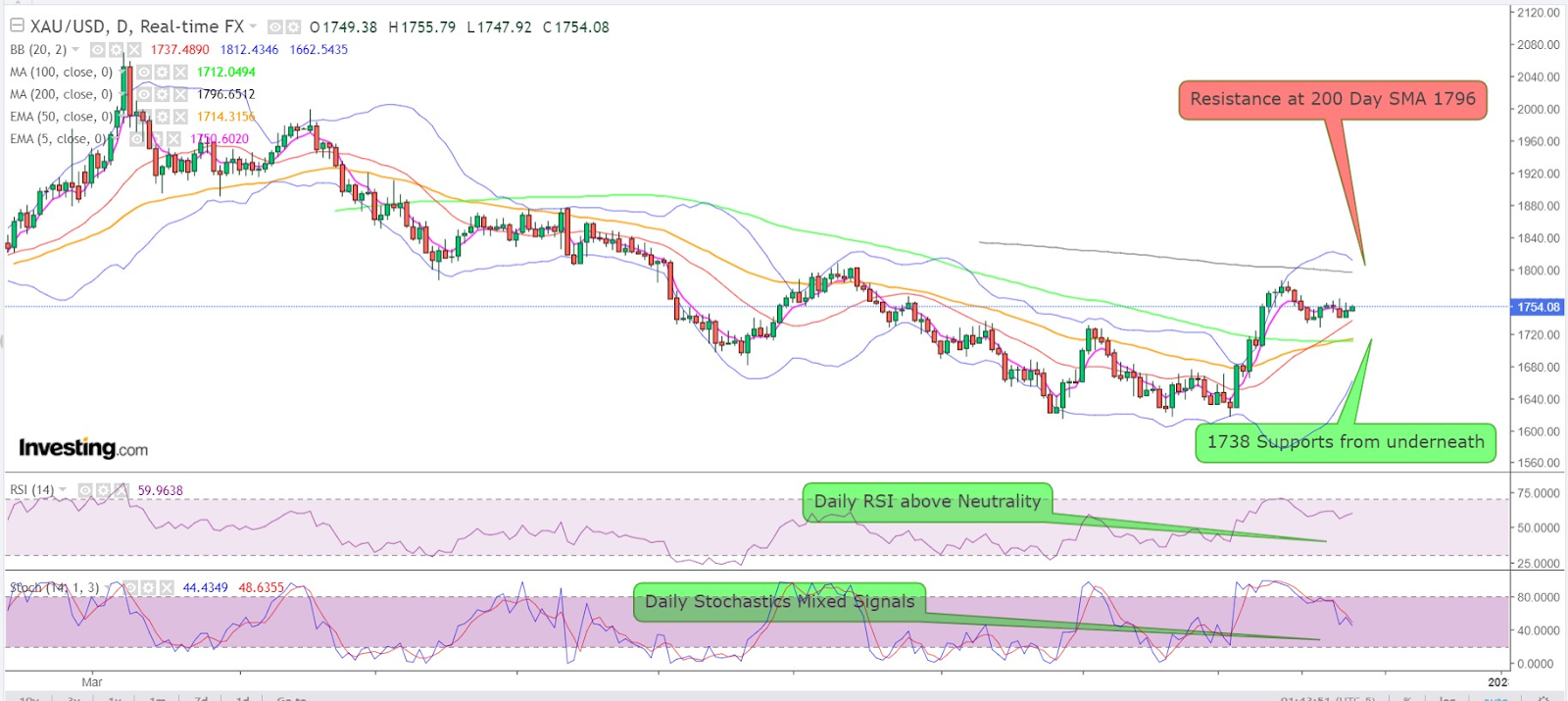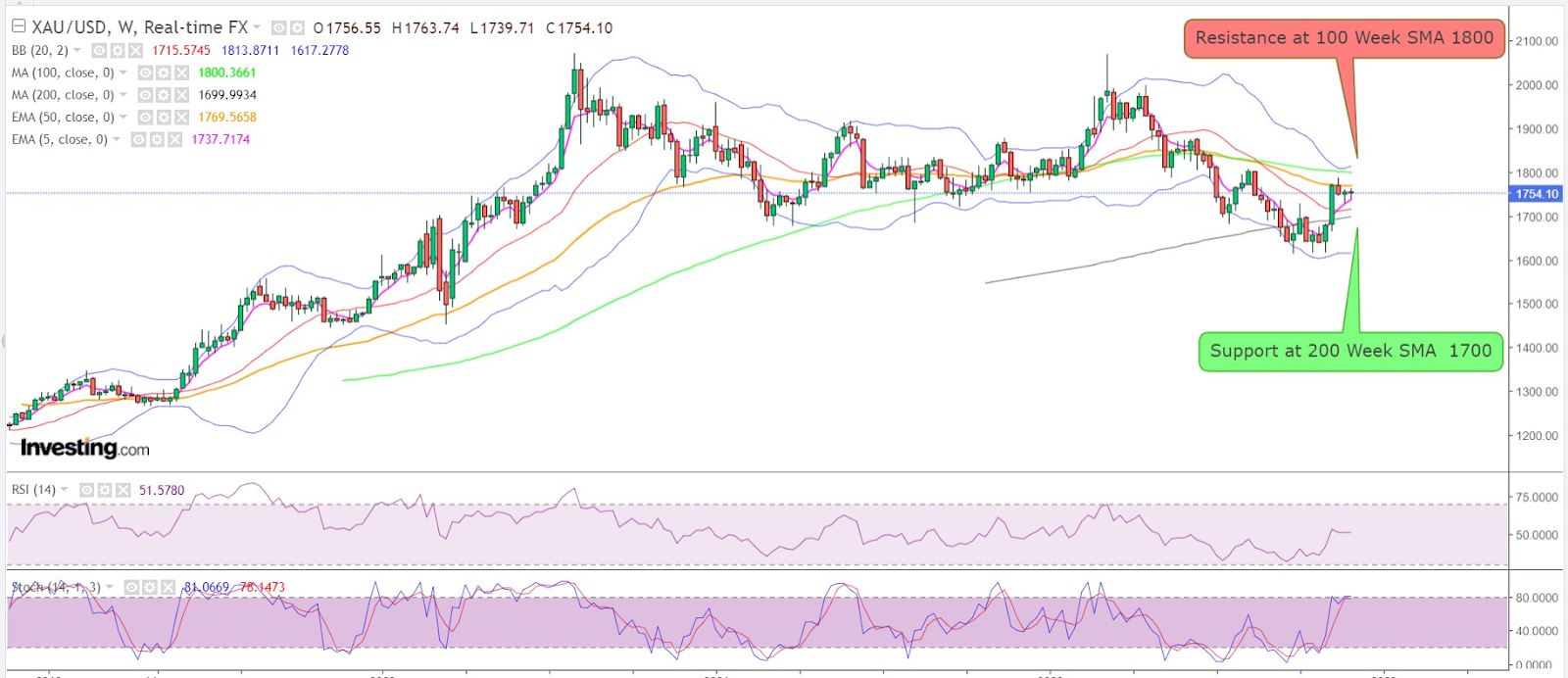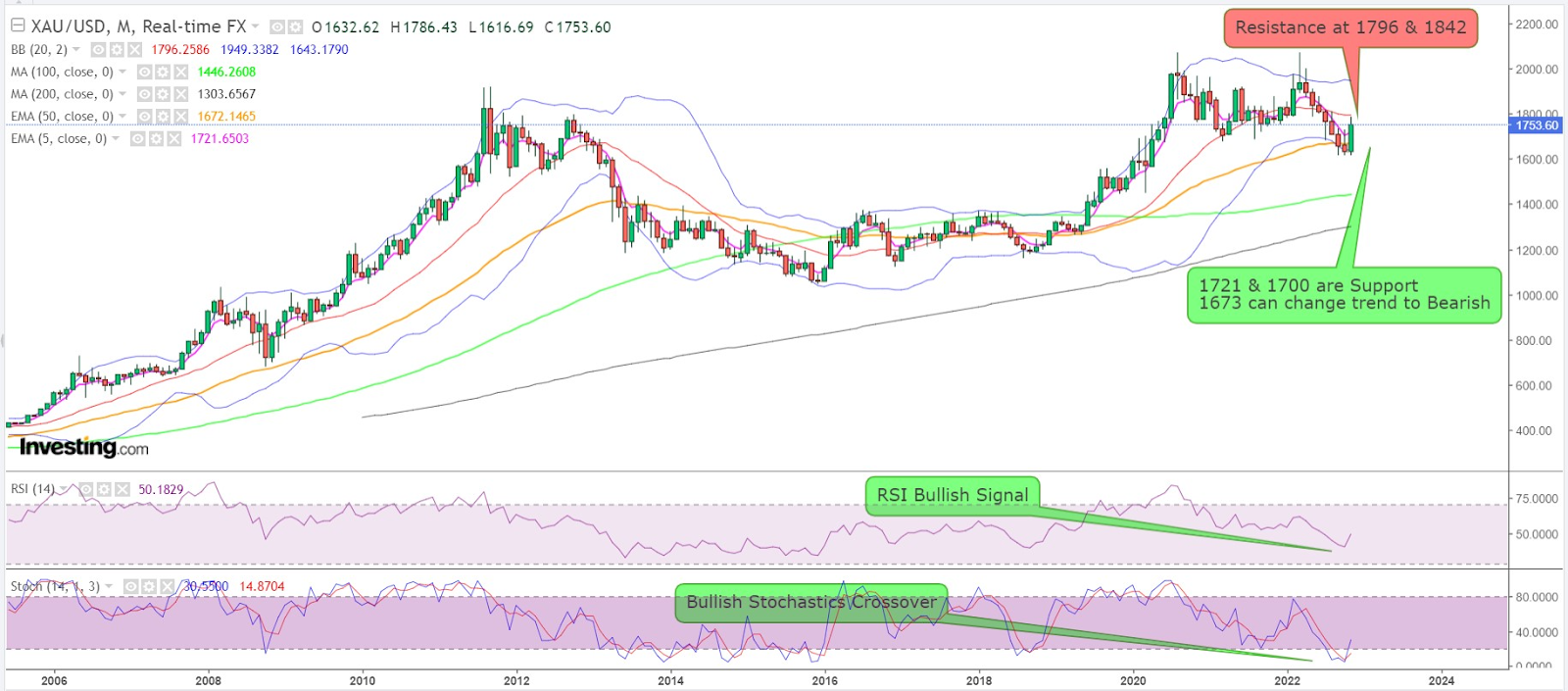- November’s 7% gain was the most for gold since May 2021
- Price needs to break beyond $1,786, otherwise will stay trapped at $1,700
- So long as Fed controls inflation narrative, gold’s upside may be limited
It has taken a year-and-a-half for gold to turn in its first respectable monthly showing after the price plunge that began at the start of the year.
As trading for November ends today, the yellow metal is poised to finish the month up almost 7%. The last time those long gold did as well was in May 2021, when the monthly gain was nearly 8%. After a shaky start for 2022, gold remained lustrous till February, when it rose nearly 6%. Thereon, it spent a record seven straight months in the red, where it lost 16% in all.

Charts courtesy of SKCharting,com, with data powered by Investing.com
November’s rebound is thus gold’s “feel-good” story.
What’s not so good, of course, is where it’s likely to go from here.
For all intent and purpose, we may have seen the best of the comeback story in gold for this year.
I say this not to short-change gold bulls expecting the current $1,700-an-ounce momentum to achieve natural evolution to reach $1,800. While that may still be possible, the odds of it happening before the year-end seem much narrower than before, given gold’s track record of the past 15 weeks.
Since its last foray into $1,800 territory in mid-August, gold has failed at every twist and turn in returning to that level.
Regardless of how well aligned the stars may be for the yellow metal—either in the form of a weaker dollar or U.S. bond yields; the occasional geopolitical “pop” from scary Ukraine headlines; or Wall Street meltdowns that typically trigger a flight to “safe-havens”—gold has been stuck in the claws of $1,700.
With the spot price of bullion and benchmark gold futures both hovering at just above $1,750 an ounce, gold seems to be getting entrenched in one trading range after another without a clear breakout, said Ed Moya, analyst at online trading platform OANDA. He added:
“It's now sitting in the middle of a potential new range between $1,780 resistance - a major level of support in the first half of the year—and $1,730 support—a big resistance level in September and October [that] turned [into] support last week.”
While November’s 7% rally is relatively good compared with its woeful showing during most of the past 18 months, gold has still come short of its true potential for one reason: the U.S. Federal Reserve.
Having unleashed the most hawkish rate hike environment since the 1980s to subdue U.S. inflation - also at its highest in 40 years, the Fed’s ultra-tight monetary policy has virtually put a chokehold on gold.
In years past, inflation on its own gave a good reason for buying gold, which offered itself as a store of value despite being a non-yielding asset. But the Fed’s jumbo-sized rate hikes since March have completely transformed this, making the dollar the de facto chief beneficiary of inflation as punters bought the greenback and sold gold on every hawkish headline.
Even before 2022 began, both the White House and economic policy-makers at the Fed have been trying to contain inflation, with the annual reading for the Consumer Price Index hitting a four-decade high of 9.1% in June before cooling somewhat to a yearly reading of 7.7% in October.
The Fed has added 375 basis points to interest rates since March via six rate hikes. Prior to that, interest rates were at a peak of just 25 basis points as the central bank cut rates to nearly zero after the global outbreak of the coronavirus pandemic in 2020.
The Fed’s rate hikes have pushed up borrowing costs, adding to higher overall expense for consumers, some of whom have begun to rein in their spending. Fears of a recession drove U.S. consumer confidence, one of the pillars of the economy, down again in November after it hit three-month lows in October, according to The Conference Board, which groups public and private corporations that track and publish economic data.
Adding to this, the cryptocurrency market—once a serious challenger to gold in terms of investor asset allocation — is experiencing possibly its worst implosion ever with the bankruptcy of FTX that has driven Bitcoin to two-year lows.
Despite all these, gold couldn’t return to $1,800 over the past 3-½ months—let alone reprise the $1,900 highs of May that would pave the path towards the near all-time highs of $2,003 it achieved just prior to that, in April.
Technical charts suggest gold could take baby steps of $20 either way, ahead of Friday’s U.S. jobs report for November that would pave the way for the next Fed hike on Dec. 14.

Said Sunil Kumar Dixit, chief technical strategist at SKCharting.com:
“As long as the 5-Week EMA of $1,738 keeps supporting the market from underneath, a retest of the 50-Week EMA of $1,770 looks like an immediate possibility,” Dixit said, referring to spot gold’s Exponential Moving Average.
In order for gold to see a bigger move up, a strong acceptance above $1,770 would be needed, said Dixit.
“You need to advance toward the swing high of $1,786, above which the monthly Middle Bollinger Band of $1,796 resides,” he said.
The 100-Week Simple Moving Average of $1,800 that acts as key resistance is just above those levels, he added.
On the other hand, if buyers failed to break through the 50-Week EMA of $1,770 and the swing high of $1,786, gold bears will be happy to initiate a sell off towards $1,740—below which $1,721 and $1,710-$1,700 can be tested, said Dixit.
“The current rebound gets invalidated if bears manage to break below $1,673, resulting in resumption of bearish pressure,” he said.

But without a major shift to the downside, the broad $1,700-$1,800 range should hold, Dixit said.
The outlook for next month itself was imminently bullish, supported by positive signals from the Relative Strength Index and Stochastics, he said.
“The bullish defiance after seven months of coordinated selling is very likely to continue taking gold to $1,800 and $1,842. The question is how long it’ll take us to get there,” said Dixit.
“Expect a whole range of price corrections and consolidation at around $1,738-$1,700 before we get there. Buyers are also likely to resurface on every correction for value buying.”
Disclaimer: Barani Krishnan uses a range of views outside his own to bring diversity to his analysis of any market. For neutrality, he sometimes presents contrarian views and market variables. He does not hold positions in the commodities and securities he writes about.
